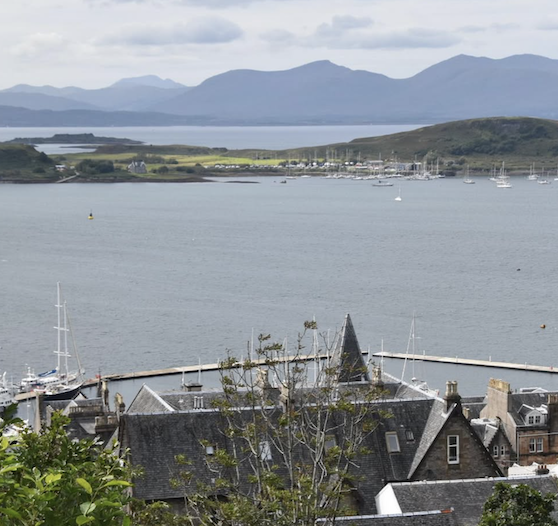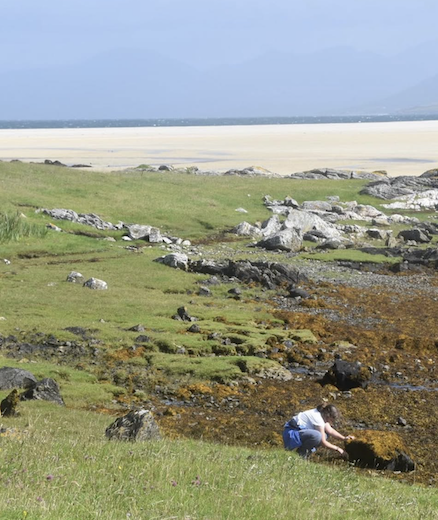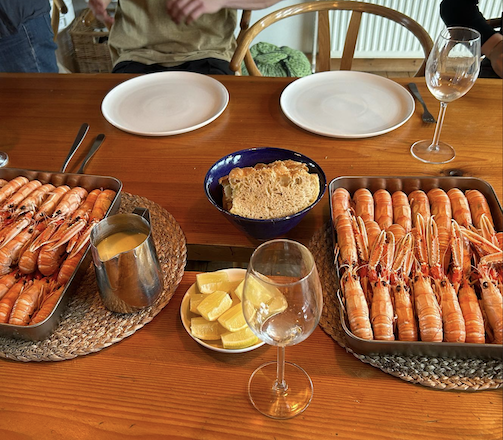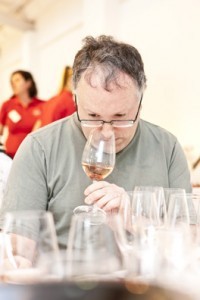What sort of wines make me think, ‘yes, I am now on holiday’?
I am nothing if not predictable. My holidays are always spent in the same cottage in the same location. My children are unaware that other places exist. Admittedly, the island where we stay is beautiful with scenery to delight and plenty of activities to do.
What’s not to love? Other than the weather during our stay. We will take any crumb of comfort. A shaft of sun would do for starters. This year we endured a hurricane and a succession of gales to wave us off, but the important thing was “nae midges”.
Before we arrive for our holiday, I invariably send an advance battalion of cases of liquid loveliness, a Whisky Galore of wine to retrieve at my leisure. In the event of wine drought. Far more than we could possibly wish to drink. The idea being that one’s desert island is really a fantasy island, and one’s holiday a celebration of the escape from everyday drinking.
As I have said in previous blogs, there is little to compare with the glorious sensation of bringing a bottle of one’s favourite wine down to where the ocean kisses the graceful curve of the sandy bay as the dipping sun sends golden rays into your eyes and turns the western skies all manner of pinks and purples. You live in the elevated beauty of the moment. Brief ecstasy ensues. This year, however, because of zero sunsets and extreme windy conditions, there were no such opportunities to experience delicious wines further amplified by Nature’s glory.
Before we arrive for our holiday, I invariably send an advance battalion of cases of liquid loveliness, in the event of wine drought. Far more than we could possibly wish to drink. The idea being that one’s desert island is really a fantasy island, and one’s holiday a celebration of the escape from everyday drinking.
Well, we can’t always dial-up-an-epiphany. The experience of wine is challenged and changed by context and mood. I notice is that my enjoyment is that much greater when I (am allowed to) bring a bottle to the restaurant as opposed to ordering off the list and paying full price. I guess this marks me out as some kind of wine brat. I am not sure whether it is the principle of not paying that appeals (surely I am not that mean), or rather that I am forced to choose the least of all evils from a list that I have no control over, a wine that I would not necessarily wish to drink on the evening in question. When that wine happens to be not “just so”, you are disappointed having to pay for what you never really wanted to drink in the first place. It is a small regret that life’s too short for.
What sort of wines make me think, ‘yes, I am now on holiday’? Fizz, for sure. The carefree snap, crackle and pop of beaded bubbles. For me, the ancestral method sparklers of Camillo Donati hit the mark and are the bookends to our vacation with that first gulp of Trebbiano Frizzante akin to the sensation of setting foot on one’ favourite sandy beach after a long absence. Anything from Marie-Courtin is my go-to lavish meditation champagne, and this year I also brought a bottle of Louis Roederer Brut Nature Blanc (Philippe Stark label), a wine I have never tried before, emblematic of the fact that holidays are for treating oneself and one’s loved ones.
There is little to compare with the glorious sensation of bringing a bottle of one’s favourite wine down to where the ocean kisses the graceful curve of the sandy bay as the dipping sun sends golden rays into your eyes and turns the western skies all manner of pinks and purples. You live in the elevated beauty of the moment. Brief ecstasy ensues.
Rosé wine is consumed more often than not. The colour alone breathes heat and liquid sunshine and the temporary abrogation of responsibility. Binner Si Rose (technically not a rosé rather a solera amalgam of skin-contact Gewurz and Pinot Gris) and Vino di Anna Jeudi 15 Rosato were two highlights, and despite the fact that they were consumed against doomy skies, they brought their interior sunshine to the party.
Being beside the seaside, beside the sea, my palate invariably craves corresponding salinity in the wines. In this regard, a Folle Blanche (vieilles vignes) from Marc Pesnot, a wine akin to liquidised oyster shell, hit the spot perfectly.
Sombre skies normally produce a yearning for red wines. This year, bar one spanking bottle of Thierry Germain Saumur-Champigny, I was red-averse, preferring to go orange instead for my shivers of gently abrasive tannin. And what a wine we drank! Pequeñita Rioja Reserva Maturana – from Alonso y Pedrajo – was the bottled sunset we never had, aglow with hot-skinned peachy fruits, a mouthful of layers, luxurious but not a jot heavy. Alas, the external conditions were rainy and windy, but had the beach beckoned, I would have been down there in a flash brandishing this wonderous amber wine solaire! Props to the Maturana grape!
In retrospect, the best holiday wines refresh the soul and the thirst in equal measure. They are agile in the sense of bending between delightful frivolity whilst maintaining a smack of seriousness. Holidays should be a vacation from taste, a kind of mental rejuvenation in which drinking wines that accord with one’s celebratory mood, is the order of the day.
Isn’t Burgundy expensive?
… is a rhetorical question uttered by those in the wine trade. The answer is that it is. Ridiculously so. I only realised this when I was in a restaurant the other week and felt like ordering a classic linear Chardonnay from the Beaune. When I looked at the price on the (reasonably price list) of my preferred bottle, my courage (i.e. my wallet) failed me and my resolve dissipated. Certain regions are now officially beyond my pocket. I assume others have the same experience.
I feel that these prices have crept up over the years without me noticing and whilst we take wine inflation for granted the increases are in a category of their own.
It is understandable that this should be the case with the succession of catastrophic climatic events. Lack of supply and high demand means that prices will inevitably climb, but we have reached where merely good wines have become a rare treat.
Not being a varietal junkie, don’t tell me that Australian or Chilean Chardonnay is a great alternative, because (whisper it loudly) – I don’t desperately need to drink Chardonnay for better or worse, for richer or poorer. Beautiful Chardonnay may be made in various countries, but to get the near the quality level of a cracking Burgundy, you would be forking out a very tidy sum.
Where can we find liquid bang for our buck? That’s a whole article in itself, however, Spain and Portugal and the Med islands, the Languedoc and Greece and southern Italy are reliable sources for excellent yet inexpensive wine. South Africa and Australia deserve mention. It is worth assaying grape varieties (and blends) that – thank goodness – are not yet in fashion. Every wine on its merits and according to the value (in pleasure) that it yields.
Slaves to the new machine
An ai is a three-toed South American sloth. A useful out word in the game of Lexicon too. AI is a different beast. I was mailed a survey today enquiring in what ways and to what extent our company uses AI in the way we conduct business. The questions were posed in such a quasi-reverent jargonistic way as to suggest that AI was a super positive tool in terms of analytics, marketing, stock control etc and it would be astonishing if our company had not already made a wholesale conversion in our practices to accommodate its benefits. I don’t believe it marks me out as a luddite if what distinguishes one business from another is its capacity to look beyond the numbers to create relationships. Call it business empathy or the personal touch, making our decisions on a human level. We spend way too much already buried in spreadsheets and charts, analysing data every which way, when we should be generating trade the old-fashioned way. Software talking to software is not as efficient as human beings talking to human beings, there being questions and personal recommendations and peculiar circumstances.
The best holiday wines refresh the soul and the thirst in equal measure. They are agile in the sense of bending between delightful frivolity whilst maintaining a smack of seriousness.
As a useful tool, AI is bruited by consultants. Which is perverse because AI will sooner or later make their jobs redundant. The government also rhapsodises about advanced technology in the workplace, which must necessarily mean that it is the Emperor’s New Clothes. They believe so devoutly that it is some form of magic bullet, pinning their hopes that it will solve many of our social problems in the way that something you don’t understand fully must be cutting edge (because you don’t understand it fully!). AI is not the solution and is very probably the problem, a statement bound to get me zapped by Skynet. And quite possibly an existential problem as evidenced by the boiling cesspit that is social media and the way that algorithms are being used to target certain sectors of society. One can say, of course, that it is not the conduit (that is, the never-ending production and parsing of data) that is at fault, but rather the sewage that flows through it. Those that manipulate AI most certainly hold the tools of power.
In a lesser way, in the world of wine, whereas modified versions of AI may have some useful applications, human contact (at all levels) still defines the nature of our industry. Which revolves around service and hospitality. Wine is a tactile, pleasure-giving substance, its growers farm the land and have a relationship with their vines, buyers taste the wines, assess them, express a preference, buy them, and then communicate the “human” story to their customers. The grape juice lives in these constant human interactions.
Wine love stats
I got a little list (or several). Read any wine magazine article and it will bristle with stats. These are cited to show us what is trending (grape variety, region, country etc). Such figures may be massaged to prove a point. What influences individual is more complex than reading about a trend and jumping on a bandwagon (albeit some people will do that). Our drinking habits are determined by a combination of personal recommendations, affordability, social media/influencers, weather, mood, and existing personal preference.
Here are my stats – but please look back at your own experiences, analyse what you are drinking, and see what floats your boat, and why.
- I taste and drink/share around 300 bottles of wine per year (excluding wine tastings)
- 99% of those consumed are natural or low intervention wines (which is my preference).
- The vast majority of these might be termed “middle of the road” natural.
- These comprise approximately 60% white wines, 20% orange/rose, 10% sparkling, 10% red.
- All wines served, having been chilled to a certain extent.
Personal evaluation
- Perhaps half a dozen wines yield epiphanies/near epiphanies. These are beautiful wines that take one on a journey. These wines are different each year, but the appreciation involves many stars aligning!
- 30 may be deemed “excellent”, in the sense they present as wholesome, nourishing, and vibrate with good energy. I notice these wines keenly and want to communicate the pleasure they afford me.
- 150 are good to very good. The bottle is finished easily. Each mouthful is solid and offers a degree of pleasure.
- 50 are good but not memorable. They serve their purpose. One wouldn’t necessarily drink them again and they are quickly forgotten.
- 50 are competent/ordinary. Nothing wrong with the wines but am unable to finish the bottle. And that is the test of a truly enjoyable wine.
- Roughly 10 bottles are faulty. Out of these, perhaps 2 are corked, 2 show VA beyond my tolerance level, and the remainder present mousiness in varying degrees.
Trending for me: Sparkling wines (especially grower champagne). Serious rosé wines (more colour, more structure). Wines made from grapes grown on limestone. Trending for me is a pretentious way of saying “wines that I generally like to drink at the moment.” These are a few of my favourite thing, therefore, and my tastes are as capricious as my moods.
“Wine and politics don’t mix”
We used to hear that sport and politics should be kept apart. Yet, boycotting is a tool that was often used successfully in the past to put pressure on regimes in repressive countries. Unfortunately, these days, money talks louder than principles in all sports and sportswashing is commonplace.
Every decision, be in personal life or business, is a matter of political choice. The inconvenient truth emerges when you examine whom you deal with and how you conduct your own business on a micro level. It is traditional (and some would say, natural) to see the point of business for the profit of the company and the people who work within it. It is an entirely different mindset to put ethics first and business after that.
It is customary to talk about political will and the need for governments to operate by best example. Yet, the climate crisis we talk about is the very choice of governments who have allowed industrial polluters to lobby them and water down remedial policies for reasons of financial expediency. It is the choice of those who vote these backsliders into power again and again, selfishly deciding short-term gain is more important than the real welfare of the planet. Every choice we make, consequently, is a political one in the final analysis – even if we choose to say and do nothing. In the wine sector, sustainability, environmental conscientiousness and regenerative farming matter because there will be no wine industry in the future unless we work together with these core principles in mind. Farmers, importers, and more importantly, consumers, can help to set a more progressive ethical agenda since market forces in a capitalistic society are the most powerful drivers for change.
Auditing each and every of one’s business transaction on an ethical basis is tricky and contentious. If you are exporting (or importing) wines, then you may well be selling into – or buying from – countries with a record of repressing human rights, committing genocide, or engaged in a cruel war. Where is the moral line in the sand? After all, countries that were former democracies are now also perpetrating crimes in all but name against their own citizens as well as those of other countries. Do we also hold the people of a country and our potential trading partners accountable for the actions of those that govern them? Politics involves making uncomfortable decisions that work against one’s self interest, but if you compromise your standards because doing the right thing is inconvenient, then you cannot claim to hold a moral position.
You may be dealing with individuals in business whose personal behaviour and ethics are the opposite of yours. Who are we to judge? Yet, rather than reserving judgement, in the end, one simply can’t sit on the fence and not call out bad behaviour when it occurs.
If you wish to change the world even in a little way, you need to develop a moral compass. This has to be said with all humility. None of us are perfect, morality is rarely black or white, and if you can’t make a living then you won’t have a business that can generate potentially positive outcomes. Adhering to the principle of recognising the ethical implications of each business decision, as well as improving the work environment within one’s own company, is a beginning. Start with positive changes that can be managed near home – and then work outwards. The central tenet is this: business can have a higher function other than existing for its own good; it can work on behalf of others – if the way that it is conducted is ethical.
We therefore need to observe The Golden Rule and put it at the forefront of business transactions. Whether or not it materially benefits us, it sets an example to others, and that is a meaningful political statement.




